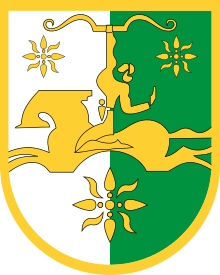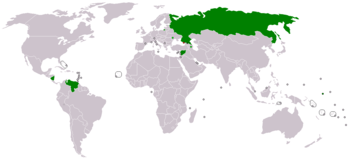Foreign relations of Abkhazia
The Republic of Abkhazia is a self-proclaimed state recognized by Russia, Syria, Nicaragua, Venezuela, Nauru, Nagorno-Karabakh, South Ossetia, and Transnistria. (The first five of these are members of the United Nations and the latter three share similar lack of international recognition) Abkhazia declared independence from Georgia in 1999,[1] but did not receive recognition from any UN member states until after the 2008 South Ossetia war. One of Abkhazia's main foreign policy goals is searching for further international recognition of Abkhazia's independence.[2]
 |
|---|
| This article is part of a series on the politics and government of Abkhazia |
| See also |
Diplomatic relations

| State | Date of diplomatic recognition | Diplomatic relations established | Notes |
|---|---|---|---|
| 17 November 2006 | 12 February 2010 |
| |
| 15 December 2009 | 15 December 2009 |
see Abkhazia-Nauru relations
| |
| 5 September 2008 | 10 September 2009 |
see Abkhazia–Nicaragua relations
| |
| 26 August 2008 | 9 September 2008 |
| |
| 19 September 2005 [note 1] | 26 September 2007[3] |
see Abkhazia–South Ossetia relations
| |
| 29 May 2018 | 4 September 2018 |
| |
| 22 January 1993 or before[note 1] | 18 January 2007 |
see Abkhazia–Transnistria relations
| |
| 10 September 2009 | 12 July 2010 |
see Abkhazia–Venezuela relations
|
Unofficial relations with UN member states
Even though Abkhazia has not been recognized by many states, it has unofficial relations with several UN member states.
Belarus
According to the Deputy Prime Minister of Abkhazia, Kan Taniya, the Abkhaz relations to Belarus are high on the priority list of Abkhazia.[5] In 1995, Belarus was opposed to the CIS sanctions against Abkhazia.[6] Bilateral relations between Belarus and Georgia were strained during the Georgian Presidency of Mikheil Saakashvili, during which Abkhazia was recognised by Russia. In March 2009, President Lukashenko referred to Abkhaz president Sergey Bagapsh as "the President of Abkhazia" in an official statement when the two met Moscow.[7] The two discussed economic cooperation, with Lukashenko stating "much work emerges after gaining independence, we would be happy if Belarus' involvement could help to solve problems in this region."[8] In November 2009, Belarusian lawmakers visited Tbilisi, Sukhumi, and Tskhinvali on simultaneous fact-finding missions to inform a decision on whether to recognise Abkhazia and South Ossetia.[9] Despite these actions and Russian pressure, Belarus never recognised Abkhazia and South Ossetia. Bilateral relations between Belarus and Georgia improved over the same period, and in April 2015 during the Georgian Presidency of Giorgi Margvelashvili, Lukashenko paid his first official visit to Georgia, during which he explicitly noted his support of Georgia's territorial integrity.[7] Since then, Georgia buys Belarus tractors "and other equipment that we would not otherwise buy", according to Georgian economist Paata Sheshelidze.[10]
Eritrea
In June 2014, the Ambassador Extraordinary and Plenipotentiary of the State of Eritrea in the Russian Federation Teklay Minassie Asgedom and Head of the Department of Asia and the Pacific of the Ministry of Foreign Affairs of the State of Eritrea Kalekristos Zariseney Gebreyezus met with a delegation from Abkhazia.[11]
Israel
In 2011, a delegation of the Israeli security firm Global CST visited Abkhazia. Representatives of Global CST declared their readiness to provide non-offensive military technologies, security equipment, and medicine, as well as invest into the agricultural sector, tourism, and mining.[12][13][14] In 2017, Abkhaz foreign minister Daur Kove visited Israel and participated in an international round table "Status of the unrecognized states and their relations with Israel" which took place in Tel Aviv University on 8 November 2017. During his trip, Kove held a number of working meetings including with Alon Davidi, the Mayor of Sderot and with Alexander Shane, the Ambassador of the Russian Federation to Israel.[15]
North Korea
In December 2017, the North Korean Chamber of Commerce contacted then-Abkhaz prime minister Gennadi Gagulia. Subsequently, an Abkhaz delegation visited Pyongyang (August 2018) and a North Korean delegation visited Sukhumi (November 2018). According to the Director of International Relations at the Chamber of Commerce of North Korea, companies of the construction business, the food and textile industry, logistics companies are interested in working with Abkhazia. Additionally, North Korean workers could be send to the Black Sea country.[16]
Turkey
The most cordial of the Abkhaz relations with UN member states without official diplomatic recognition are with Turkey. Turkey does not follow the Georgian embargo rules and the country hosts a large Abkhaz diaspora.
Visa Problems
Several states which do not recognise Abkhazia routinely refuse visa applications of Abkhazians, even though the application is made in Moscow on the basis of the person's dual Russian citizenship.
- In October 2006 the American embassy denied a visa to Minister for Foreign Affairs of Abkhazia Sergei Shamba, who was to attend a UN Security Council discussion in New York City on the United Nations Observer Mission in Georgia.[17]
- In February 2009 the Indian embassy denied visas to two Abkhazian women employed by the Ministry of Foreign Affairs who had been invited by the Jawaharlal Nehru University to attend an international conference. In response, Foreign Minister Shamba sent letters to Indian External Affairs Minister Pranab Mukherjee and to the Ambassador of India to Russia, Prabhat Prakash Shukla. The letters protested the very unfriendly attitude towards Abkhazia, pointed out that the applicants’ Russian citizenship had not been taken into account and warned that Abkhazia might respond in kind, denying visas to any future Indian visitors.[18]
- On 17 March 2009 the Spanish embassy in Moscow refused visas for the members of the Abkhazian Futsal team, which was to take part in the first Copa de les Nacions de Futsal in Catalonia.[19]
- On 13 May 2009, the German embassy in Russia initially denied a visa for a sick Abkhazian 16-year-old boy who was to undergo a complicated operation in a Munich clinic. Foreign Minister of Abkhazia Sergei Shamba said "such actions are out of line with universal humanitarian principles and are a direct violation of Abkhazian residents' rights."[20] However, the next day the German embassy in Moscow issued the visa, stating that the delay was due to the need to coordinate with their consulate in Tbilisi, which normally handles visas.[21]
Relations with other self-declared independent states
The Sahrawi Arab Democratic Republic, and the Turkish Republic of Northern Cyprus[22] welcomed Russian recognition of Abkhazia. The militant Palestinian organization Hamas also welcomed the recognition of both Abkhazia and South Ossetia.[23][24][25]
In 2007, members of the parliaments and civil society organizations from Northern Cyprus and Western Sahara observed the Abkhazian parliamentary election.[26]
Diplomatic missions
Offices in Abkhazia
Abkhazian missions
Membership in international organizations
Abkhazia belongs to the Unrepresented Nations and Peoples Organization (UNPO) and Community for Democracy and Human Rights.
International economic relations
The National Bank of the Republic of Abkhazia has maintained its baseline interest rate for 11 years. Debt is negligible, external liabilities are just 5.6 per cent of GDP, and Abkhazia has never reported a balance of payments deficit.[27]
See also
Notes
- The date, when Abkhazia, South Ossetia and Transnistria recognize each other is not clear. Abkhazia and Transnistria signed a Treaty on Friendship and Cooperation on 22 January 1993, South Ossetia and Transnistria a Treaty on Friendship and Cooperation on 12 October 1994 and Abkhazia and South Ossetia a Treaty on Friendship and Cooperation on 19 September 2005.
References
- "Regions and territories: Abkhazia". BBC. 2009-05-13. Retrieved 2009-09-11.
- "Abkhazia: Broad International Recognition Priority". 23 January 2013. Retrieved 1 April 2014.
- "Страница не найдена". Archived from the original on 27 April 2015. Retrieved 5 April 2016.
- http://tass.com/world/1007058
- "»Wir wären gerne Mitglied der Eurasischen Union«". junge Welt. 9 June 2016. Retrieved 9 June 2016.
- Unrepresented Nations and Peoples Organization: Yearbook, Leiden/Boston 1997, p. 42.
- "Bilateral Ties Between Georgia and Belarus Take a New Turn". Jamestown Foundation. 28 April 2015. Retrieved 9 June 2016.
- "Lukashenko Meets Abkhaz Leader". Civil Georgia. 24 March 2009. Archived from the original on 6 March 2014. Retrieved 9 June 2016.
- "Belarusian MPs Visit Tbilisi, Sokhumi, Tskhinvali". Civil Georgia. 18 November 2009. Archived from the original on 6 March 2014. Retrieved 9 June 2016.
- "Georgia still paying Belarus for non-recognition of Abkhazia and South Ossetia". Belsat. 6 March 2018. Retrieved 22 December 2019.
- "Eritrean Delegation Visited Abkhazia, South Ossetia and Crimea". TesfaNews. 12 June 2014. Retrieved 7 December 2016.
- "Israel gives boost to Abkhazian economy". RT. 19 April 2011. Archived from the original on 17 September 2011. Retrieved 12 December 2018.
- "Israeli Security Firm Executives in Abkhazia". Civil Georgia. 14 April 2011. Retrieved 12 December 2018.
- "To Abkhazia one more Delegation from Israel arrived". GHN. 14 April 2011. Retrieved 12 December 2018.
- "Daur Kove took part in the international conference in Israel". Ministry of Foreign Affairs of the Republic of Abkhazia. 9 November 2017. Retrieved 12 December 2018.
- "Деловое предложение: ТПП Абхазии и делегация из КНДР обсудили сотрудничество". Sputnik Abkhazia. 27 November 2018. Retrieved 28 November 2018.
- "US embassy in Moscow refused visa to head of Abkhazia MFA". Caucasian Knot. 2006-10-14. Archived from the original on 2011-07-28. Retrieved 2009-05-17.
- Kuchuberia, Anjela (2009-02-26). Посольство Индии в Москве отказало в визах сотрудницам МИД Абхазии. Caucasian Knot (in Russian). Retrieved 2009-05-17.
- Kuchuberia, Angela (2009-04-04). "Abkhazian athletes rejected visas by Spanish embassy in Moscow". Caucasian Knot. Archived from the original on 2011-07-28. Retrieved 2009-05-17.
- "German embassy in Russia denies ill Abkhazian teen visa - ministry". RIA Novosti. 2009-05-13. Retrieved 2009-05-17.
- "Germany issues visa to seriously ill Abkhazian teenager". RIA Novosti. 2009-05-15. Retrieved 2009-05-17.
- "Talat voices respect for will of peoples of S. Ossetia and Abkhazia". Today's Zaman. 2008-08-28. Archived from the original on 2008-09-01. Retrieved 2008-08-28.
- ХАМАС приветствует признание независимости Абхазии и Южной Осетии (in Russian). Gazeta.ru. 2008-08-26. Retrieved 2008-08-26.
- "Only Palestine's Hamas Backs Kremlin's Recognition of Abkhazia, South Ossetia". Georgian Daily. 2008-08-27. Retrieved 2008-08-27.
- Coughlin, Con; Blomfield, Adrian (2008-08-27). "Georgia: Europe unites to condemn Kremlin". London: Daily Telegraph. Retrieved 2008-08-27.
- "Pridnestrovie MPs to monitor Abkhazia vote as election observers". Tiraspol Times. 2008-07-04. Archived from the original on 2008-07-04. Retrieved 2018-05-23.
- "What Abkhazia's crypto dalliance teaches us about monetary sovereignty". Financial Times. 2020-01-20. Retrieved 2020-01-20.